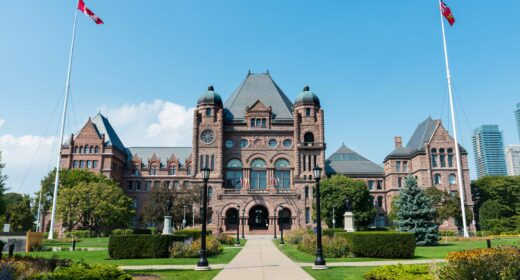A grievance arbitrator has ruled that Air Canada underpaid one of its unions by millions of dollars, in a profit-sharing payment for the year 2005. The union was represented by Steve Waller of Nelligan O'Brien Payne.
The dispute originated in the 1993 concession bargaining that took place while Air Canada was under bankruptcy protection. Air Canada negotiated steep concessions but offered its unions a profit-sharing plan. Some of those unions, including the Air Canada Pilots Association, negotiated the plan into their collective agreements.
Under the plan, employees were to share profits not only from Air Canada, but also from its parent ACE Aviation, and from the subsidiaries of Air Canada and ACE. The key language provided that employees would share in:Adjusted pre-tax profits excluding foreign exchange and other extraordinary gains and losses…
That phrase was drafted by the employer and accepted “as is” by ACPA, without any discussion about its meaning.
A dispute over that phrase arose in 2006, when the profit share payments for 2005 were distributed. Air Canada took the position that a strict application of the formula would have yielded profit-sharing payments to all employees combined of about $20 million. Air Canada in fact distributed $43.5 million. It asserted that it had voluntarily added an extra $23.5 million to the profit-sharing payments, in a manner not required by the collective agreement.
But in calculating the profit-sharing pool, Air Canada had also excluded certain corporate gains, on the grounds that the transactions giving rise to the gains “had characteristics of extraordinary items.” Most notably, Air Canada had excluded, from the profit to be shared, a $190 million “dilution gain” that ACE Aviation had made in 2005 from selling part of its equity in its subsidiary, Aeroplan.
ACPA grieved that the 2005 profit sharing payout violated the collective agreement, and the grievance was referred to arbitrator Claude Foisy, Q.C. ACPA argued that only two kinds of items could be excluded from the corporate profits to be shared: gains and losses on foreign exchange, and gains and losses from transactions that qualified as ”extraordinary” under Canadian Generally Accepted Accounting Principles (GAAP). Under GAAP, items qualify as “extraordinary” only when they have all three of the following characteristics:
- they are not expected to occur frequently over several years;
- they do not typify the normal business activities of the entity; and
- they do not depend primarily on decisions or determinations by management or owners.
ACPA led unchallenged expert evidence that the Aeroplan dilution gain did not qualify as “extraordinary” under GAAP. Air Canada contended for various alternative interpretations of the phrase; “adjusted pre-tax profits excluding foreign exchange and other extraordinary gains and losses”.
In an April 12, 2012 award, arbitrator Foisy upheld ACPA's interpretation, stating: "I must add that the plain language or dictionary definition suggested by the Company is fraught with subjectivity and uncertainty as to its application and is susceptible to generate more conflicts between the parties. As outlined earlier in the context of justifying “Foreign Exchange”, it permitted the Employer to argue that “extraordinary” included one-time non-operating items and asset sales, even if these asset sales were made in the normal course of business. Another example is that the dilution gains resulting from the sale of part of Aeroplan in 2005 was pre-planned and part of ACE’s strategy to increase its value. The normal operations of a holding company like ACE include the buying and selling of assets and the surfacing of values. In my opinion the Aeroplan dilution gain is not an extraordinary item, whether the dictionary or GAAP definition is used…On the other hand, the evidence and workability of the PSP mechanics point decisively in favour of applying the GAAP’s specialized definition to the word extraordinary. "
Arbitrator Foisy has reserved jurisdiction over the quantification of damages, but his award suggests that they will be between $2 and $3 million for 2005 alone. Indeed, profit-sharing continued to apply in 2006 and 2007, when ACE sold even greater portions of equity in its subsidiaries, reaping much larger dilution gains. The profit-sharing payments for those years have also been grieved. Arbitrator Foisy's award means that the damages for those years could be considerable.


